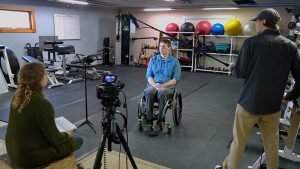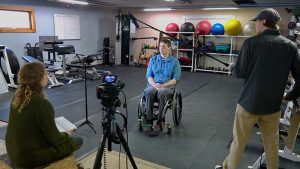Growing a Cluster Initiative

In this first post for the CoLab’s Project-Based Learning Series, Business and Marketing faculty member Roy Stever talks about his work developing the North Country Community Development project with his colleagues and students. We look forward to publishing more of Roy’s reflections this Spring, and welcoming contributions from other instructors and from students who want to reflect on their experiences with PBL at Plymouth State.
Background of the Project
In the Fall of 2016, a group of three Plymouth State faculty members (me, Eric Spieth from Business, and Pam Anneser from Graphic Design) embarked on a cluster “adventure” in the North Country of New Hampshire. We were not specific about “what” we were going to do, or particularly “how” we would mobilize students through engaged learning in the community. We were guided only by the passionate input of community leaders in Lancaster NH, and our own instincts. They were looking for PSU’s help in stimulating several community development interests. We, as faculty, were interested in addressing underlying economic and social challenges in the region and engaging students in both learning and “solving.”
Spring 2017 brought together sixty students across ten academic majors, enrolled in four courses in business and graphic arts, and working in seven cross-course teams. Each team was responsible for communicating with an identified partner in Lancaster to both “scope” needs and propose specific solutions and plans. Projects ranged from energizing Main Street, to assisting entrepreneurs in realizing immediate market opportunities.

Major efforts centered on developing build-out concepts for the recently-acquired, historic Lancaster National Bank building, as well as specific marketing support for Peter Rizzo (Fitness Professional), trainer and founder/owner of RizFit. Another important area of inquiry involved constructing various personas of young, transitional adults based on interviews with sixteen individuals who had found “pathways” of personal and professional success in the region.
The original “Lancaster Project” took on expanded scale in the North Country through six discrete year-long cluster projects in 2017-18. A continuing effort with RizFit was augmented by new teams working with Northern Gateway Chamber of Commerce and Colonel Town Recreation in Lancaster, the Studio School in Littleton, and the Town of Lisbon. Another team examined various means of stimulating French-speaking tourism across the region.
Attention turned in 2018-19 to refining our North Country “community builders” targets, of all ages, in the North Country while developing new points of PSU value – APEX business training to support entrepreneurs and promising non-profit organizations and a Healthy Communities initiative designed to assist community leaders identify and address priority social and economic needs in individual towns.
To date, after five semesters, PSU’s North Country Community Development (NCCD) initiative has engaged over two-hundred students in challenging encounters with community partners, delivering solutions, recommendations, plans and ideas, with impact for towns, businesses and non-profits. The program has grown to now include six energetic faculty members, representing the arts, language, history, health education and business. Plans are underway to reach out to new communities, Gorham and Berlin.
It is safe to say that NCCD can continue grow, with a healthy “stable” of projects in the region, and the continued commitment of PSU.
Starting-Out: Advice for Colleagues
Before setting out on a cluster or open-lab engagement, you may want to first be sure of your own motivations, before considering the “win” for students, collaborators, the partner(S) or PSU. In all likelihood, if the project is conceived as part of a deeply-held belief or passion and you can spot an unmet need, then the rewards for the other stakeholders will be high, as well. Given the time and mental transposition of converting traditional teaching approaches in to experiential learning, you – and especially you – need to be all in. The others will more easily understand your idea and share the excitement, becoming contributors and not falling victim to the inevitable trepidation.
If you otherwise accept the constraints imposed by other parties (e.g. a student reticence, limiting academic schedule, the need for rapid payback, an unrealistic partner organization), you will quickly lose heart.
This was the easy part for me, from the very first call-to-action for cluster activity. A number of us were actively considering PSU’s support to the North Country at the time. Clusters became an immediate canopy under which we could solve a number of puzzles around collaboration, student engagement, funding and mandate. The point is, though, that the opportunity had already been framed – in my case, by a life-long frustration that the North Country of New Hampshire is somehow fated to a marginal existence for many, including entrepreneurs, artists and small business owners who were simply missing out on a few key fundamentals. Those missing pieces were absolutely within the grasp of our juniors and seniors, and could be successfully passed along under the guidance of committed faculty. For me, it was worth a try.
My ”why” didn’t need to be the same as anyone else’s, not even collaborators, in order to grow the excitement. Indeed, over nine years of teaching, my inspiration was shaped by early events – my wife and I joined Rachelle Lyons (Research Assistant Professor of Environmental Studies) and her environmental science students on two field trips, cleaning up garbage in a scenic river and assessing environmental damage in our town. Next, Pam Anneser’s (Associate Professor, Graphic Design) PSU Student Design Course and Eric Spieth’s (Contract Faculty, Entrepreneurship) APEX Accelerator provided fundamental business and branding support to entrepreneurs and small business owners. Engaging with Denise Normandin (Teaching Lecturer/Project Director) and health education students around Blue Zones has informed the North Country healthy living initiative, and Suzanne Gaulocher (Assistant Professor, Health and Human Enrichment) now brings great expertise in the area of community readiness. Kate Harrington’s (Associate Professor of French) existing Bienvenue NH initiative addresses an important dimension around French tourism development, while Linda Upham Bornstein’s (Teaching Lecturer, History) deep personal engagement in Lancaster has guided a showcase learning experience for highly energized students over five semesters at RizFit. My point: each of us come with a different set of motivations, all deeply held and mutually supportive, a great collaboration.
What is it that you are really most excited about? Find that first, without worrying about other stakeholders just yet. Then, watch the ideas grow!


